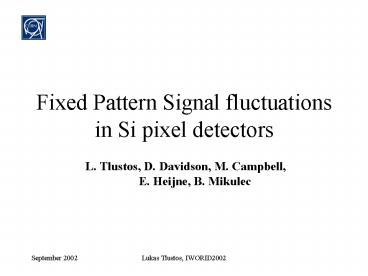Fixed Pattern Signal fluctuations in Si pixel detectors - PowerPoint PPT Presentation
Title:
Fixed Pattern Signal fluctuations in Si pixel detectors
Description:
Correction map calculated using 128V detector bias data. September 2002 ... Magnitude of fluctuations decreases with detector bias ... – PowerPoint PPT presentation
Number of Views:22
Avg rating:3.0/5.0
Title: Fixed Pattern Signal fluctuations in Si pixel detectors
1
Fixed Pattern Signal fluctuations in Si pixel
detectors
- L. Tlustos, D. Davidson, M. Campbell, E.
Heijne, B. Mikulec
2
Outline
- Flatfield studies with Medipix1 chip and
underdepleted and depleted standard high
resistivity Si p on n sensors - Charge sharing
3
Flatfield Correction
- Additive correction
- Multiplicative correction
4
Motivation
- Signal to noise ratio SNR is a crucial parameter
for image quality and resolution - Poisson statistics of the incident beam marks the
upper limit of the achievable SNR - SNR of Medipix1 approaches Poisson limit when
flatfield correction is applied - Trying to understand the sources of
inhomogeneities in the raw data in order to
improve image quality
SNR
theory corrected uncorrected
Normalized acquisition time
5
Flatfield Measurements
- Large number of flatfield acquisitions (150-1000)
- Count rate 10kHz/pixel
- accumulated total counts 2.5 106 counts/pixel
- with
- 3 Medipix1 assemblies
- Detector bias ranging from 4V-128V
- Using
- Mo tube, 30um Mo filter, 20keV, 28kV
- W tube, 125um Al filter, 1cm PMMA, 20kV, 30keV
6
Flatfield Measurements
Spectra calculated following J M Boone, A E
Chavez Med Phys 23, 1997 J M Boone, T R Fewell,
R J Jennings Med Phys 24, 1997
7
Number of counts - Vbias
- Plateau of count rate is a measure for depletion
voltage - Normalized number of counts increase with energy
content of the beam ? charge sharing
8
Results 10C3_G8
- Detector bias voltage 3,4,8,12,16,24,32,48,64,80,
100,128V - Correction map calculated using 128V detector
bias data
9
Results 10C3_G8
Single detached pixel
10
Results 11B6_5J
- Detector bias voltage 3,4,8,12,16,24,32,48,64,80,
100V - Correction map calculated using 100V detector
bias data
11
Results 11B6_5J
12
10C3_G8 map 4V corrected
13
10C3_G8 map 8V corrected
14
10C3_G8 map 12V corrected
15
10C3_G8 map 16V corrected
16
10C3_G8 map 24V corrected
17
10C3_G8 map 32V corrected
18
(No Transcript)
19
11B6_5J map 12V corrected
20
11B6_5J map 16V corrected
21
11B6_5J map 24V corrected
22
11B6_5J map 32V corrected
23
11B6_5J map 48V corrected
24
11B6_5J map 64V corrected
25
(No Transcript)
26
10C3_G8 map profile 4-16V
3x3 mean filter
Raw data
27
10C3_G8 map profile 4-32V
3x3 mean filter
Raw data
28
10C3_G8 map profile 32-128V
3x3 mean filter
Raw data
29
11B6_5J map profile 4-32V
3x3 mean filter
Raw data
30
11B6_5J map profile 32-100V
3x3 mean filter
Raw data
31
(No Transcript)
32
Conclusions (1)
- Low detector bias wave pattern clearly visible,
ascribed to bulk doping inhomogeneities causing
fluctuations of the width of the depletion layer - Magnitude of fluctuations decreases with detector
bias - But small variations remain even at high bias
voltages, may be due to local variations of the
pixel geometry
33
Detached Pixel 10C3_G8
34
Detached Pixel 10C3_G8
- Count decreases with detector bias
- Generated charge collected by adjacent pixels
Normalized count
Vbias V
35
Detached Pixel 10C3_G8
- Sum of map weights of the 4 direct neighboring
pixels lt 5 - Field not strong enough to redistribute all the
chare generated
weight
Vbias V
36
Conclusions
- Fixed pattern fluctuations are consistent with
bulk doping inhomogeneities originating in Float
Zone technique of crystal growth - Inhomogeneities can influence the charge
collection properties of sensor - Fixed pattern fluctuations remain even in
overdepletion and affect the obtained resolution
in imaging applications ? correction is necessary - Implications also to optimization of resolution
in particle tracking - Effects could also be used to study material
properties































